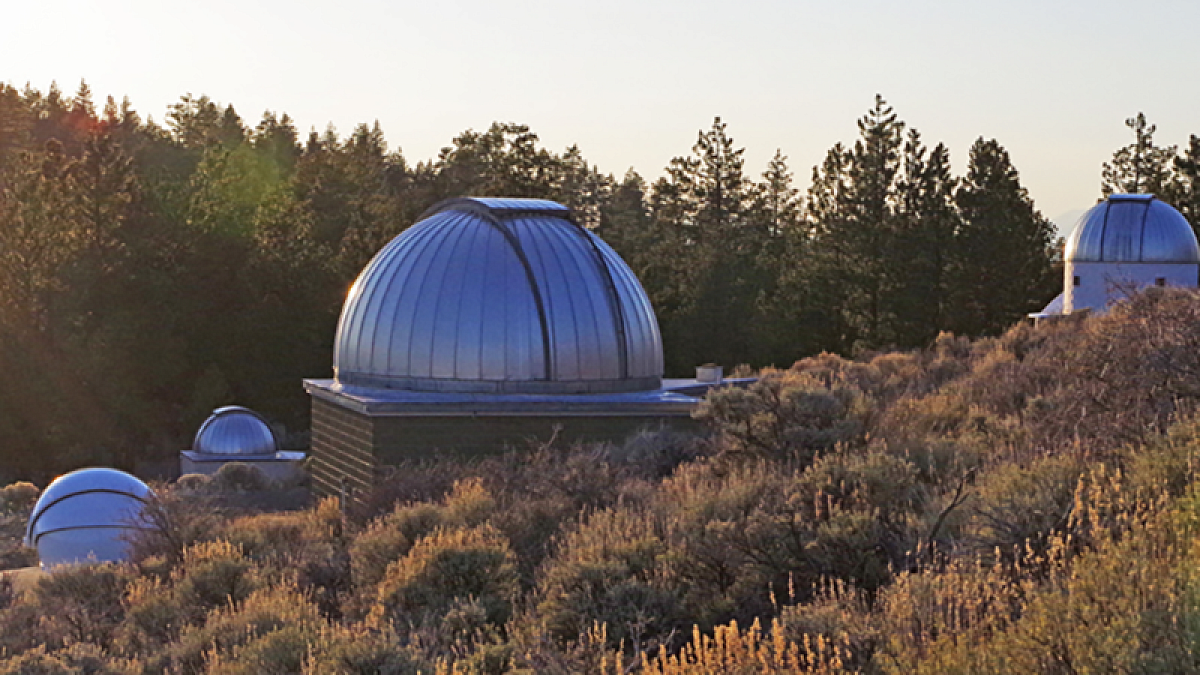At the UO’s Pine Mountain Observatory, things are looking up both literally and figuratively.
Not only are the telescopes scanning the heavens, Pine Mountain’s staff and students also are on cloud nine over a new gift that could put the “little observatory that could” on the astrophysical map. The investment of almost $90,000 from a Central Oregon foundation will help undergraduate students contribute real science, expand community outreach and modernize some important equipment.
The gift comes from the Roundhouse Foundation, a Sisters-based philanthropy dedicated to celebrating and raising community awareness of the arts in Sisters and Central Oregon. Pine Mountain is 26 miles southeast of Bend in Central Oregon’s High Desert.
Scott Fisher, astronomy lecturer in the UO physics department and outreach coordinator for Pine Mountain and other programs, said the gift puts the observatory and its four telescopes close to having the right mix of equipment and resources to really boost its contributions to astrophysical research and public education.
“We feel we are two steps away from the big time,” he said. “The Roundhouse funds fill a gap that’s going to let us begin initiating this exciting program.”
The funds, $27,500 a year for three years, will help expand public outreach and educational programs at the 6,300-foot mountaintop observatory, improve access for undergraduate students conducting research at the site and upgrade key astronomical equipment.
In particular, the funds will buy new tools for the 16-inch Robbins Telescope, the newest addition to the observatory and the only one that can be operated remotely from the UO campus. That telescope already has a sophisticated camera, filters and tracking system that allow student researchers to pursue publishable research.
With the Roundhouse funds, Fisher and his students will be able to upgrade equipment that will allow them to make preliminary observations from campus. This early testing will pave the way for true “remote observing” when the internet connection to Pine Mountain is upgraded.
With a better connection to the telescopes, Fisher and his team will be able to go to K-12 schools and set up remote viewing sessions, starting with schools in Central and Eastern Oregon. Getting students from select rural schools engaged with the observatory is a main goal of this gift from the foundation.
The funds also will help cover the cost of ferrying UO students out to the remote observatory to conduct research, help with the public tours and sky parties on summer weekends and do upkeep on the telescopes and support systems. Pine Mountain has a strong emphasis on research opportunities for undergraduate students and involves them in all aspects of observatory operations.
Some new equipment, like a new laptop for operating the Robbins Telescope and a machine that cleans the delicate optics, also are on the list.
While the gift may seem modest in comparison to the seven- and eight-figure investments the UO has received recently, when measured against the size of the modest Pine Mountain program it has the potential to be almost as transformative as much larger bequests.
“A gift of this size, while on the big scale it may seem small, the impact is incredible for us,” Fisher said. “This gift is what’s going to allow us to really bring the vision to life.”
Ultimately, Fisher sees Pine Mountain filling a gap in astrophysical research by observing and tracking objects of scientific interest larger observatories aren’t able to spend much time on. In addition to carrying out and publishing their own research, students could alert the astronomy community to new developments that require a bigger telescope and share in any new discoveries.
“There are not many university-operated observatories left in the U.S., so we are in a pretty special position with Pine Mountain,” Fisher said. “Our plan is to use the observatory to turn out students with literal hands-on research, engineering and technical experience that will be attractive to graduate schools as well as jobs at large research facilities around the world.”
To get to that point, the observatory also needs to modernize the mirrors and optical system in the Robbins Telescope as well as upgrade the internet connection. The Roundhouse funds will get them part way, and Fisher is hopeful they can find the funding to complete that project and other facility improvements.
“It feels like we’re really on an upswing now,” he said.
—By Greg Bolt, University Communications


